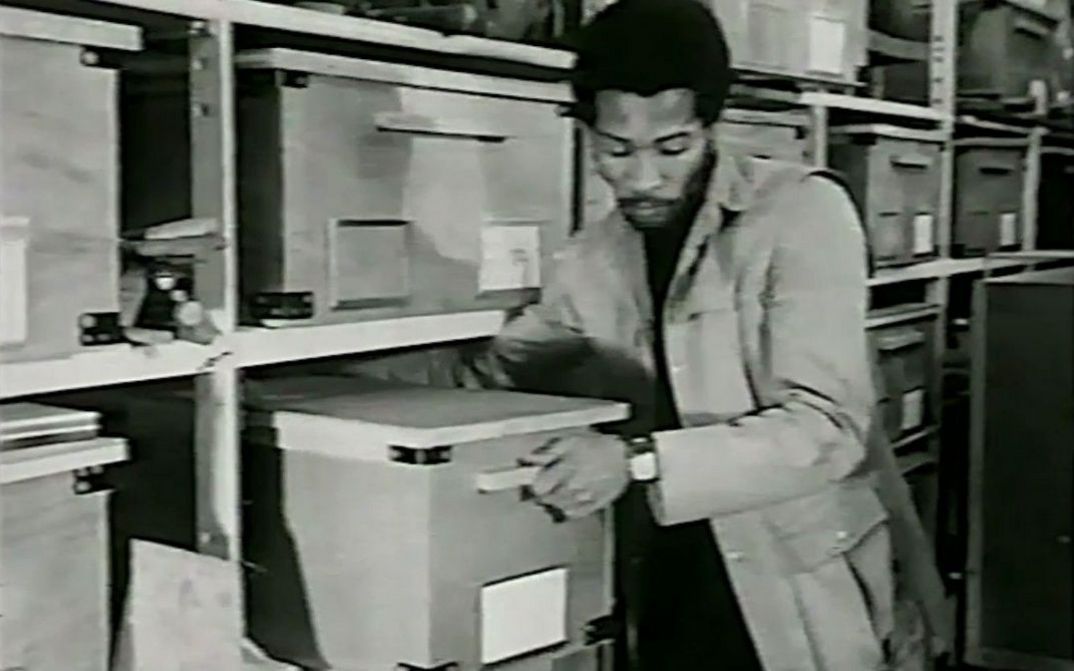Films by Nii Kwate Owoo

Sat 21.09.
18:30
Cinema
Arsenal 1
zu den Ticketszu dem KalenderGuests: Nii Kwate Owoo, Arike Oke, Judith Opoku-Boateng Moderation: Nikolaus Perneczky
Shot over 50 years ago, YOU HIDE ME revealed for the first time hundreds of thousands of previously unseen, rare Asante art treasures stolen by the British after the Sagrenti War and the invasion of Kumasi by Field Marshall Garnet Woseley in the 1870s, as well as other art treasures looted by British Expeditionary Forces. In 1970, Ghanaian filmmaker Nii Kwate Owoo managed to outsmart the directors of the British Museum and its security system to gain access to the museum’s secret underground vaults and film valuable African artifacts stowed away there. One day was enough to shoot this short film revealing the extent of the theft of African artifacts, stashed in plastic bags and wooden crates — and to make a case for their restitution.
YOU CAN’T HIDE ME – THE RETURN OF THE LOOTED AND STOLEN ARTEFACTS IN THE BRITISH AND THE FOWLER MUSEUM IN THE US is Nii Kwate Owoo’s newest film and resonates with its predecessor. It will have its world premiere during the festival.
You Hide Me Nii Kwate Owoo Ghana 1970 DCP | English OV | 16 min.
You Can’t Hide Me – The Return of the Looted and Stolen Artefacts in the British and the Fowler Museum in the Us Nii Kwate Owoo Ghana 2024 DCP | English OV | 20 min.
A CRAB DOES NOT GIVE BIRTH TO A BIRD: NII KWATE OWOO ON HIS FILMS AND FORMATIVE INFLUENCES
"Nigeria's Financial Footing" (March 30, 1971) on, amongst others, YOU HIDE ME (Page 2)
Born and raised in Ghana, Nii Kwate Owoo has been producing and directing films since the early 1970s. After graduating from the London Film School, he formed the first independent African film production company (Ifriqiyah Films) in the UK under which he produced and directed his first film, YOU HIDE ME, a now widely acclaimed film on the colonization of African art in the British Museum. He was the Editorial Manager of Écrans d’Afrique, published by FEPACI, The Pan African Federation of Film Producers. He has been active in the movement for a Pan African Cinema and co-produced and directed the feature documentary film OUAGA – African Cinema Now in 1988 and Ama: An African Voyage of Discovery (1991) with Dr. Kwesi Owusu. He is currently in the pre-production fundraising stage for his new five-part docu-drama series based on the history of the Asante Empire, The Asante Kingdom of Gold.
Arike Oke leads the screen heritage mission at the British Film Institute in the role of Executive Director of Knowledge, Learning, and Collections. Her practice is rooted in social justice and the role of culture in giving strength to, and inspiring, individuals and communities. Formerly she was the Managing Director for Black Cultural Archives, the home of Black British history. Her fiction is published in magazines and anthologies, her critical art writing has been featured in The Girls Are and This is Tomorrow. Her factual writing has appeared in many different journals. She is a trustee of iniva, a board member for the Institute of Historical Research Trust, and a fellow of the Arts Council’s Museums and Resilient Leadership program.
Judith Opoku-Boateng is the archivist in charge of the J.H. Kwabena Nketia Archives of the Institute of African Studies, University of Ghana. She has presented papers at conferences, symposia, and workshops on audiovisual heritage preservation locally and globally. She is the current Chair of the Diversity Task Force of the International Association of Sound and Audiovisual Archives (IASA), as well as its ambassador for Ghana and West Africa. Additionally, she serves on the Research Archives and Program Committees of IASA. Through her publications, policy papers, keynotes, and archival work, she has contributed to the emergence of new standards in audiovisual archiving in the Global South.
Nikolaus Perneczky is a Research Fellow at Queen Mary University of London, where he is working on a post-doctoral project on film heritage and restitution. Related publications include a book chapter arguing for the restitution of Africa’s displaced and sequestered film heritage (2023), a book chapter on Indigenous claims to images and sounds held by national archives in Australia (forthcoming), and the edited volume Restitution and the Moving Image (under review with Amsterdam UP). He is currently preparing a monograph titled Against Development: Early African Cinema as Worldmaking (Oxford University Press).